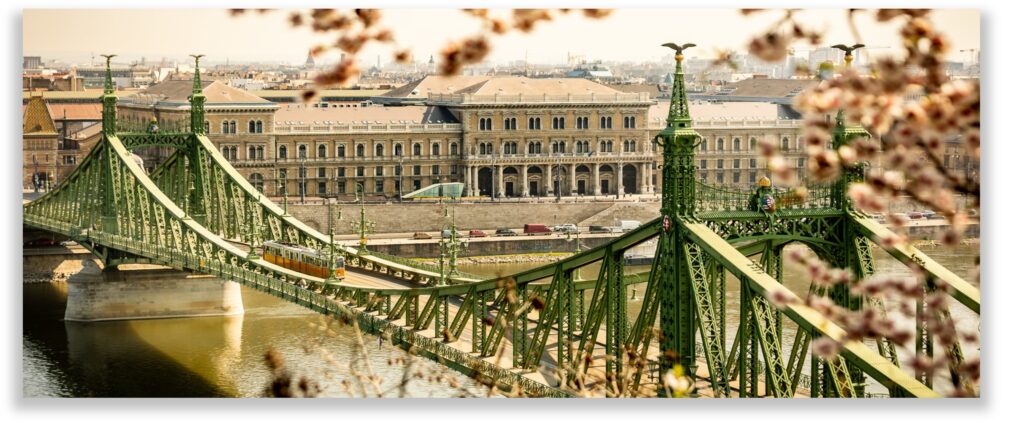
Budapest is a beautiful city located in the heart of Europe with easy access from the continent and all around the world. The following information will help you plan your trip and enjoy your stay in the city. We wish you a safe and sustainable journey!
Arriving in Budapest
If you take the train to Budapest, you will arrive at one of the main train stations of the city, from which you can easily access your hotel by public transportation or by taxi. Please, see the following section for more information.
If you arrive by car, make sure to ask your hotel if they provide parking space (and for how much). The city centre is rather crowded and it may be a challenge to find a parking spot. Public parking is not very cheap and may be limited to 3 hours in certain locations.
If you fly to Budapest, we recommend taking a taxi from the airport to your accommodation. Use the airport’s official contracted taxi company ‘Főtaxi’, which has a counter right outside the Arrivals Hall. They will ask the name of your hotel and will assign you a taxi, which will take you to the city centre in about 20-25 minutes. The fee to the city centre should be around EUR25-35, which you can pay by cash or credit card.
A cheaper alternative, especially if you travel alone, is the airport minibus, which will collect a few passengers and take you to your hotel. This will take a bit more time, but will still take you to your hotel directly. You can either use their counter at the Arrivals Hall or book your trip on their website.
You can also opt for public transportation. The Airport Express Bus will take you to a number of spots in the city centre in about 40 minutes. You can find more information here.
Exchanging money at the airport may include a hefty surcharge, thus using your bank card for payments for transportation and exchanging money later in the city centre is a sensible idea.
Transportation in the city
Public transportation in Budapest is excellent. You can reach any point in town by bus, tram or underground (‘metro’) and the main lines are served very frequently. Underground trains connect the main railway stations and the city center. Most public transportation routes operate until about 11 p.m., the metro runs until 11:20 p.m. (or later in the summer), while tram no. 6 runs all night. There are also night buses along the main routes but it’s important to check the timetable as these are much less frequent.
Tickets for all public transportation facilities are identical and are valid for one trip not depending on how far you want to travel (however, you need a new ticket each time you change to another line except when changing on the underground). The current price of a single ticket is around one Euro. Tickets have to be bought in advance at vending machines at main transportation hubs, buying a ticket from the driver is usually not possible. There are several types of season tickets if you plan to travel around a bit more and you may also want to buy a ‘Budapest Card’ which offers free entrance to cultural sights and other points of interest (for more information check out this site). You may also want to download the BudapestGo app, which is useful to plan your trips around town.
Taxis in Budapest are bright yellow, use standard rates and should use a meter when starting the trip. We recommend using a reputable taxi company like Főtaxi, Budapest Taxi, 6×6 Taxi or City Taxi. Uber is also available in the city. Getting around in the city centre should set you back by about EUR10-15 for a 10-15 minute trip. Taxi drivers usually take a credit card.
Currency and shopping
The official currency of Hungary is Forint (“Ft” or “HUF”). The exchange rate at the moment is around 1 EUR = 400 HUF.
For most purchases the most comfortable method of payment is using your credit or debit card, which are accepted in most of the shops, supermarkets, restaurants, hotels, taxis, transportation ticket vending machines etc. (most common cards accepted are Visa, Eurocard/Mastercard and Maestro – suitable for POS terminal use).
If you still need cash, you can use ATMs (“Bankomat”), which are all around town. However, you want to check their conditions and we recommend to avoid Euronet ATMs, which provide poor exchange rates and charge large commissions.
If you want to exchange your money at exchange agencies then check that the difference between the buying and selling price is not excessive and that they don’t charge a very high commission.
For planning the amount of cash to exchange/withdraw, you can expect prices to be at or a little bit lower than prices in Western Europe (e.g. Germany).
Weather
Climate: temperate zone, continental. July is usually the hottest month of the year, with temperatures around 30 degrees Celsius during the day. Some thunderstorms are possible.
Safety
Budapest is rather safe compared to other Western cities, but it is still important to be careful and not to leave your valuables unattended as well as to watch your belongings in crowded situations (e.g. train stations and public transportation). Also, check the prices and your bill in restaurants and bars to avoid surprises and behave just as cautiously as you would in other big cities.
The quality of tap water in Budapest is excellent for drinking and cooking, so it is not necessary to worry about buying mineral water to drink. Similarly, food you can by in supermarkets and restaurants is European quality and safe to consume.
While the traditional cuisine of Hungary is heavy with meat, vegetarian options in restaurants are easily available. Good restaurants should also be able to help you if you have a special diet.
We wish you a pleasant stay in Budapest!